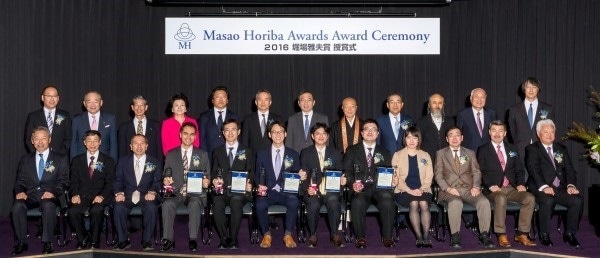
On October 17, 2016, HORIBA held the 13th Masao HORIBA Award Ceremony to honor and commemorate the achievements of researchers engaged in developing innovative technologies.
The target technical field for the awards is decided each year with a focus on the principles and fundamental technologies fostered by HORIBA to spotlight unique research and development whose achievements and potential need to be publicized to the whole world.
This year's theme is "Situational Awareness Technologies to Enable Autonomous Driving."
The 2015 ceremony was held under the theme of "Nanoparticle Measurement", the 2014 ceremony "Gas Measurement", and the 2013 ceremony "Water Properties Measurements”.
HORIBA holds these ceremonies every year with a sense of mission to broadly publicize the achievements of researchers engaged in further advancing the analysis and measurement technologies that are indispensable for the development of science, engineering, and industry.
Masao HORIBA Awards 2016 Winners
Winners
Associate Professor
Graduate School of Engineering, Department of Electronics and Computer Science, University of Hyogo
"Fast 3-D Imaging of Human Body using Ultra-Wideband Radar"
Associate Professor
Institute for Frontier Science Initiative, Future society creation core, Autonomous vehicle research unit, Kanazawa University
"Development of high dependable Localization method in order to realize fully automated vehicle in urban area"
- Dr. Pongsathorn Raksincharoensak
Associate Professor
Department of mechanical Systems Engineering, Tokyo University of Agriculture and Technology
"Shared Control in Advanced Driver Assistance Systems Based on Risk Predictive Driving Intelligence Model"
Honorable Mentions
Project Researcher
Institute of Gerontology, The University of Tokyo
“Recognition of Driving Environment for Automated Driving by Lean Sensors”
Associate Professor
Department of Civil, Environmental and Geodetic Engineering,
The Ohio State University
“Ubiquitous Geospatial Positioning via Knowledge Discovery from Geographic Information Systems”
Automated driving is a very timely theme. Automated driving was attracting the attention of many participants at the ITS World Congress held in Melbourne last week as well as at the G7 Transport Ministers' Meeting held in Karuizawa, Japan, last month. Automated driving and measurement technologies will become more important than ever before in the near future. The Masao HORIBA Award winners for this year were all unanimously selected by the judges. I hope that the winners will further contribute not only to automated driving but also to the development of science, as a result of receiving the award, and continue to conduct original research.
Dr. Yoshihiro Suda, Masao HORIBA Award Deputy Chairperson
Also: Professor and Director of the Advanced Mobility Research Center, Institute of Industrial Science, the University of Tokyo
Autonomous driving not only overturns the commonly accepted idea that the driver sitting behind the steering wheel is always responsible for his or her driving; it also has the possibility of changing the powertrain calibrations, safety and environmental regulations, as well as vehicle packaging including cabin entertainment, and even traffic control. However, whether or not such changes can practically be implemented depends heavily on the development of suitable sensors and control technologies. I hope that the technologies invented by this year’s award winners will contribute to the future of mobility that ensures safety, reduces environmental impact and opens the doors to a new era.
Dr. Masayuki Adachi, HORIBA's Senior Managing Director
Dr. Masao HORIBA (1924-2015)
Born in 1924, Dr. Masao HORIBA established the HORIBA Radio Laboratory when he was still an undergraduate student majoring in physics at the Kyoto Imperial University. During that time, he successfully developed Japan’s first glass electrode type pH meter and was called a pioneer of student ventures. This laboratory later turned into the foundation for HORIBA, Ltd., which now provides a wide range of analysis, measurement and control instruments worldwide.
He was actively involved in supporting startup businesses in Kyoto and he promoted further cooperation between industry and universities. In 2006, he was awarded the "PITTCON Heritage Award,” given by the Chemical Heritage Foundation (CHF) to honor those whose entrepreneurial careers shaped the instrumentation and laboratory supplies industry and by doing so also transformed the scientific community at large.